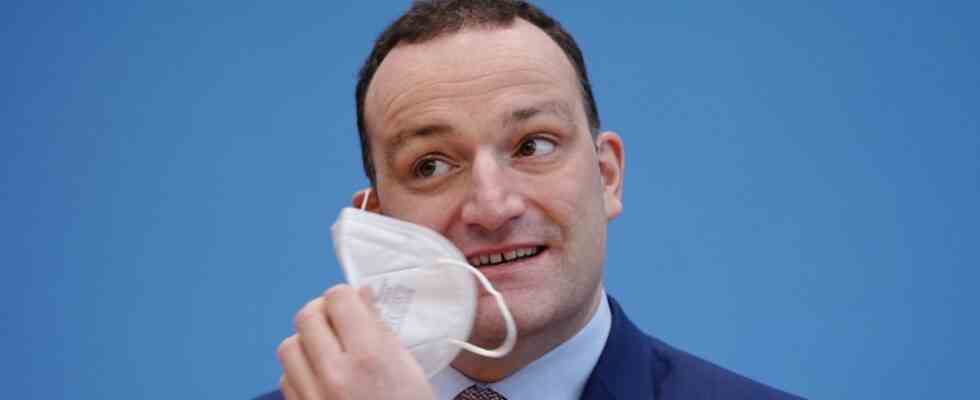Sounds like a tepid joke, but less than two years ago Jens Spahn was Germany’s most popular politician. At that time, in an early phase of the pandemic, the fight against the corona virus seemed to be a political stroke of luck for the ambitious CDU man. The party chairmanship, the chancellor candidacy – for Jens Spahn everything was supposedly within reach.
But then it didn’t work.
From the very top to the very bottom
Shortly after the peak of his popularity, the then Federal Minister of Health experienced a political crash that is not often seen. When Spahn’s time at the head of the Federal Ministry of Health came to an end on December 8 last year, he was politically at the bottom: unpopular with the population, burnt in the party. Since then, Spahn has been looking for a way to reinvent himself politically. What else can he do? He is only 42 years old, at some point he wants to be something again.
Already a classic: RKI boss Lothar Wieler (left) and Health Minister Jens Spahn (right) explain the latest corona numbers in summer 2021. In the middle Chancellor Angela Merkel.
(Photo: Michael Kappeler/dpa)
And that’s how you have to read the book that Spahn is publishing these days. “We will have to forgive each other a lot” – written together with the journalists Olaf Köhne and Peter Käfferlein – tells of the two years in which Spahn, as Federal Minister of Health with the corona pandemic, was supposed to manage a crisis of unprecedented proportions. It is his attempt to at least partially regain the authority to interpret this period. The question is: is it more than that?
self-criticism? Yes, but only in homeopathic doses
Spahn writes right at the beginning that he wants to honestly reflect on the events of that time. “Critical, also self-critical, but without belittling or ignoring what has been achieved.” In terms of self-criticism, he only keeps this promise to a very limited extent. Because of course one tinkers his own heroic story here.
You can read how North Rhine-Westphalia’s Health Minister Karl-Josef Laumann (CDU) informed him about the Corona outbreak in Heinsberg (“Jens, we have a problem”), how the Prime Ministers complained about the lack of protective equipment (“Jens, where do my masks stay?”) and as Spahn already suspected that the idea of an Easter rest in 2021 would not work: “Now (…) I had a feeling that instead of the Easter rest there would be Easter chaos.”
He tells of endless meetings and weekends worked through. And how he wants to have taken the wind out of the sails of excited nurses: “I noticed that some were still screaming, of course – but many knew I was right.”
In the center of the hurricane: According to the publisher’s text, this is how Jens Spahn (CDU) felt during the two years of the pandemic.
(Photo: Kay Nietfeld/dpa)
But there are some things he doesn’t tell either. For example, Spahn addresses the affair surrounding his private real estate transactions, which put him under a lot of political pressure in the middle of the pandemic. He writes in detail about the need for a private retreat, which led to his husband and he wanting to buy a house together: “As a top politician, you hardly have anything like privacy anymore.”
Nevertheless, the purchase of the house that was finally found was unfortunate. At the peak of the pandemic, it was “a really bad time and, seen from that point of view, a mistake,” writes Spahn. However, he fails to mention that the property purchase was by no means criticized because of the timing. But rather because of the unclear financing. The listed villa has, as its owner put it nicely, “comparatively high value”. And the question of how Spahn could afford it from a salary as a federal minister was therefore politically relevant – not the time of the purchase.
As an author, Spahn is like a politician: sometimes he doses the truth too homeopathically.
Awaiting Lauterbach’s appointment at the steakhouse
That doesn’t mean that there aren’t exciting aspects in his book. The passages in which he describes how he experienced the increasingly irritable mood in society are definitely an exciting document of the time. In a few moments, Spahn even lets you look behind the facade, which is always controlled: around the very end, when he talks about his last day in office.
His successor Karl Lauterbach (SPD) had already moved into his office, but the official handover was not scheduled until the afternoon. “So I didn’t know where to go until the 3 p.m. handover.” As Spahn then reports about how he and his husband hung around in the steakhouse for hours to somehow kill time: That may not change anything about his mixed political record, and it is still unexpectedly touching.
Jens Spahn, Olaf Köhne, Peter Kaefferlein: We will have to forgive each other a lot. How the pandemic has changed us – and what it teaches us for the future. Inside views of a crisis. Heyne-Verlag Munich 2022. 304 pages, 22 euros. E-book: 17.99 euros. (in stores from Wednesday, September 28th)

